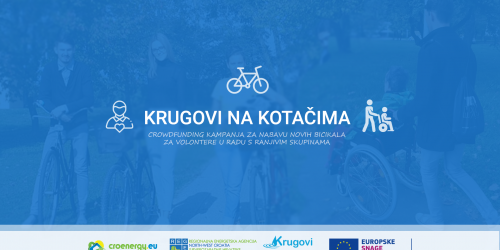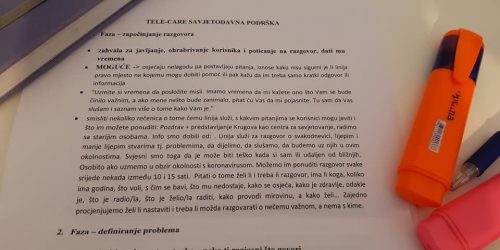How to find and apply for an ESC volunteering project
Last year, as I was approaching my university graduation, I realized I wasn’t too keen on finding a regular job in my city right away. I wanted to have another (after my Erasmus study exchanges) international experience, try something new and I thought volunteering might be a good opportunity to do that. Soon I found out about the European Solidarity Corps. Back then I knew nothing about the programme, I hadn’t met anyone who participated in it before, I wasn’t sure how exactly it worked. So I spent quite some time reading all the info I could find. I made my decision that I want to try it really fast but I still had to find a suitable project and figure out the application process… There was a lot of information to take in. Through all of this I wished there were more tips from actual participants available…
I can imagine that if you’re reading this, you might be in a somewhat similar position. To help you out a bit, I decided to describe the process and share my own experiences from applying to ESC volunteering projects.
Registering for ESC
If you’re interested in European Solidarity Corps opportunities, you should probably start with… registering for the Corps. You can do that simply by creating an account online on the ESC page on European Youth Portal.
After registration you should complete your profile with some personal information, including your education and work experience, languages you speak, your availability for projects (dates), the knowledge and experience you can bring to the ESC and your motivations to get involved. You can also determine what types of projects you’re interested in and to which countries you would be willing to go. Don’t forget to upload your CV to the profile as well! The portal recommends Europass format for that.
Taking some time to prepare your profile carefully might really pay off – the organisations can find and contact you directly with project offers based on your answers (if you agree to that) and in general, this might be their first introduction to you. Make a good first impression. 🙂
Finding a project
Once your profile is ready, you can go ahead and check the “Opportunities” tab, where you will find all of the ESC project offers published by organisations. You can easily filter them by topic, start/end dates or country. Keep in mind that although cross-border volunteering activities are the most popular when it comes to ESC projects, you can also decide to participate in a project in your country of residence.
Now you can scroll through the list, select some projects that seem interesting to you and read their descriptions. Each description should contain information about the activities, provided accommodation and training and the requirements for participants. If you’re still not sure about something after reading the description, don’t hesitate to contact the organisation with your questions.
Using the European Youth Portal was my preferred way of finding and applying for projects butyou can also try looking for projects for example on facebook groups, especially the official European Solidarity Corps group.
Perhaps you already know an organisation which runs ESC projects. They might offer places on certain projects developed by them within the country or by their partners abroad, in which case the organisation will serve as a supporting (sending) organisation. What are supporting organisations, though…?
Finding a supporting (sending) organisation
To participate in a cross-border volunteering activity, you will need a supporting organisation in your home country (country of residence). The role of that organisation is to prepare, support and train you before departure, mediate between you and the host organisation and provide support upon return from your activity. If you don’t know an organisation that could do that, the easiest way to find one is by checking the official database of volunteering organisations approved to run European Solidarity Corps projects on the European Youth Portal. You can then check the organisation’s website to see if they’re accepting new volunteers or simply contact them and ask if they’re ready to support you.
This is exactly how I found my supporting organisation – all it took was a search in the database and an email! I went for an organisation in my city, so we could easily meet if needed, but remember this is not always necessary.
It might be a good idea to look for a supporting organisation in advance, maybe even before you start applying to projects, so you don’t have to stress about it later. The fact that you’re prepared might also be appreciated by the hosting organisation when you apply. 😉
Applying for the project
Now that you’ve found a project you like and at least gave a thought to finding a supporting organisation, all that’s left is the actual application. This part can look different for each project, which is why you have to read very closely what is required.
If you found a project in the database on the European Youth Portal, often the description won’t say anything about how to apply. This means you can simply do it through the portal by clicking on the “Apply” button on the project page. You will then be asked to write a very short motivation statement (500-1000 characters) which the organisation will receive with your application. I suggest you save this motivation statement so you can use it for future applications but try not to use an exact copy-paste every time – adjust your statement slightly depending on the project description. In this case, how you completed your participant profile plays a significant role again.
Sometimes the organisations might ask you to fill in and submit their own forms or to send them your CV and motivation letter by email. This is also okay. However, in those cases I chose to submit both the application they asked for and the application through the portal – just to be sure! 😉
No matter what you’re asked to submit, the most important requirement is definitely the application deadline! Check it carefully and set a reminder for yourself if you have to – don’t miss your opportunity!
Usually, if the organisation liked your application, you will be invited to a video call interview. There might also be additional recruitment steps after that – for example, I was once asked to submit an additional questionnaire and later called back for a second interview.After all of that is done, all there’s left is waiting for an answer…
As you can see, the application process for ESC volunteering projects is not very difficult at all! I hope you found this article helpful and I wish you the best of luck on your ESC adventure!
Kornelia Makowska






